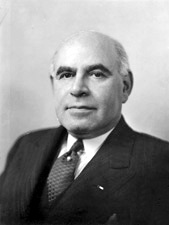Herbert H. Lehman
| Herbert H. Lehman | |
|---|---|
 |
|
|
United States Senator from New York |
|
|
In office November 9, 1949 – January 3, 1957 |
|
| Preceded by | John Foster Dulles |
| Succeeded by | Jacob K. Javits |
| 45th Governor of New York | |
|
In office January 1, 1933 – December 3, 1942 |
|
| Lieutenant |
M. William Bray (1933–1938) Charles Poletti (1939–1942) |
| Preceded by | Franklin D. Roosevelt |
| Succeeded by | Charles Poletti |
| Lieutenant Governor of New York | |
|
In office January 1, 1929 – December 31, 1932 |
|
| Governor | Franklin D. Roosevelt |
| Preceded by | Edwin Corning |
| Succeeded by | M. William Bray |
| 1st Director General of the United Nations Relief and Rehabilitation Administration | |
|
In office 1943–1946 |
|
| Preceded by | none |
| Succeeded by | Fiorello H. La Guardia |
| Personal details | |
| Born |
Herbert Henry Lehman March 28, 1878 New York City, New York, U.S. |
| Died | December 5, 1963 (aged 85) New York City, New York, U.S. |
| Political party | Democratic |
| Spouse(s) | Edith Louise Altschul |
| Children | Hilda Lehman Wise Peter Gerald Lehman (predeceased) John Robert Lehman |
| Parents | Babetta Newgass Lehman Mayer Lehman |
| Profession | Banker |
| Religion | Judaism |
| Signature | |
Herbert Henry Lehman (March 28, 1878 – December 5, 1963) was a Democratic Party politician from New York. He served from 1933 until 1942 as the 45th Governor of New York and represented New York State in the US Senate from 1949 until 1957.
He was born to a Reform Jewish family in New York City, the son of Babetta (née Newgass) and German-born immigrant Mayer Lehman, one of the three brothers who cofounded the Lehman Brothers investment banking firm. Herbert's father arrived from Rimpar, Germany, in 1848, settling in Montgomery, Alabama, where he engaged in the cotton business, and eventually moved to New York City after the Civil War.
He attended The Sachs School, founded by Julius Sachs. In 1895, he graduated from Sachs Collegiate Institute in New York City, and in 1899, he graduated with a B.A. from Williams College. After college, Lehman worked in textile manufacturing, eventually becoming vice-president and treasurer of the J. Spencer Turner Company in Brooklyn. In 1908, he became a partner in the investment banking firm Lehman Brothers of New York City with his brother Arthur and cousin Philip. During World War I, he became a colonel on the U.S. Army general staff. By 1928, when he entered public service, he had withdrawn entirely from business.
Lehman became active in politics in 1920 and became chairman of the finance committee of the Democratic Party in 1928 as a reward for having been a strong supporter of Alfred E. Smith. He was elected lieutenant governor of New York in 1928 and 1930 and resigned from Lehman Brothers upon taking office. He then served four terms as Governor of New York, elected in 1932 to replace Franklin D. Roosevelt (who had been elected to the presidency), and re-elected in 1934, 1936 and 1938. Unlike Smith, Lehman was a supporter of Roosevelt's New Deal and implemented a similar program in New York.
...
Wikipedia
